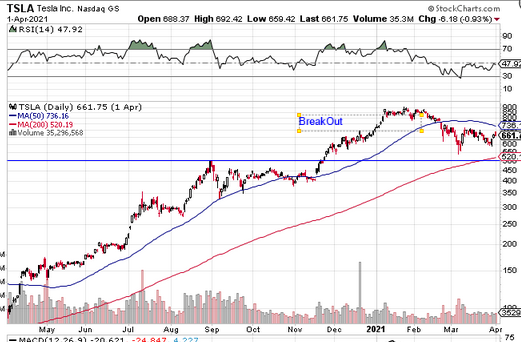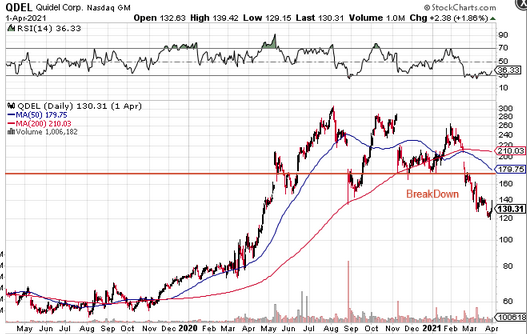Stock To Pick
Below are the list of stocks can be watched for today's breakout or breakdown strategy. Entry to stock or option can be made based on confirmation of breakout or breakdown prices. The coloured signals can be looked in each stock section to identify the strategy along with technical-analysis.
What is a BreakOut?
A breakout in stocks is when a stock rises above the resistance or breakout level from the consolidation area of its recent trading range.

For example, as mentioned in above picture TESLA Inc(TSLA) stock has been trading in the range of $350-$520 for the past couple of months. $350 price range would have made a strong support level, whereas $520 is the resistance where it can have breakout from that price. After the stock price rallies above $520 with increased volume, it is considered a breakout stock.
What is a BreakDown?
A breakdown in stocks is when a stock drops below the resistance or support level from the consolidation area of its recent trading range.

For example, as mentioned in above picture Quidel Corp(QDEL) stock has been trading in the range for $179-$280 for the past couple of months. $280 price range would have been resistance level, whereas $179 price range would be support level and price dropping from the support level would create breakdown trade for trader to short the stocks. After the stock price drops below $179 with increased sell off, it is considered a breakdown stocks.
How to trade a BreakOut/BreakDown stocks?
In-order to trade a breakout/breakdown stocks, the initial steps would be identifying the stocks which can be expected to breakout or breakdown. This site provides an ability to run through 1000+ of stocks on daily basis and identifies a stock which can enter into support or resistance level for near breakout/breakdown can happen in weeks to months time line.
The website runs through algorithm of identifying ascending/descending triangle patterns and based on the pattern it identifies the target price where it can reach. When trading breakouts/breakdown, it is important to consider the underlying stock's support and resistance levels. The more times a stock price has touched these areas, the more valid these levels are and the more important they become. At the same time, the longer these support and resistance levels have been in play, the better the outcome when the stock price finally breaks out.